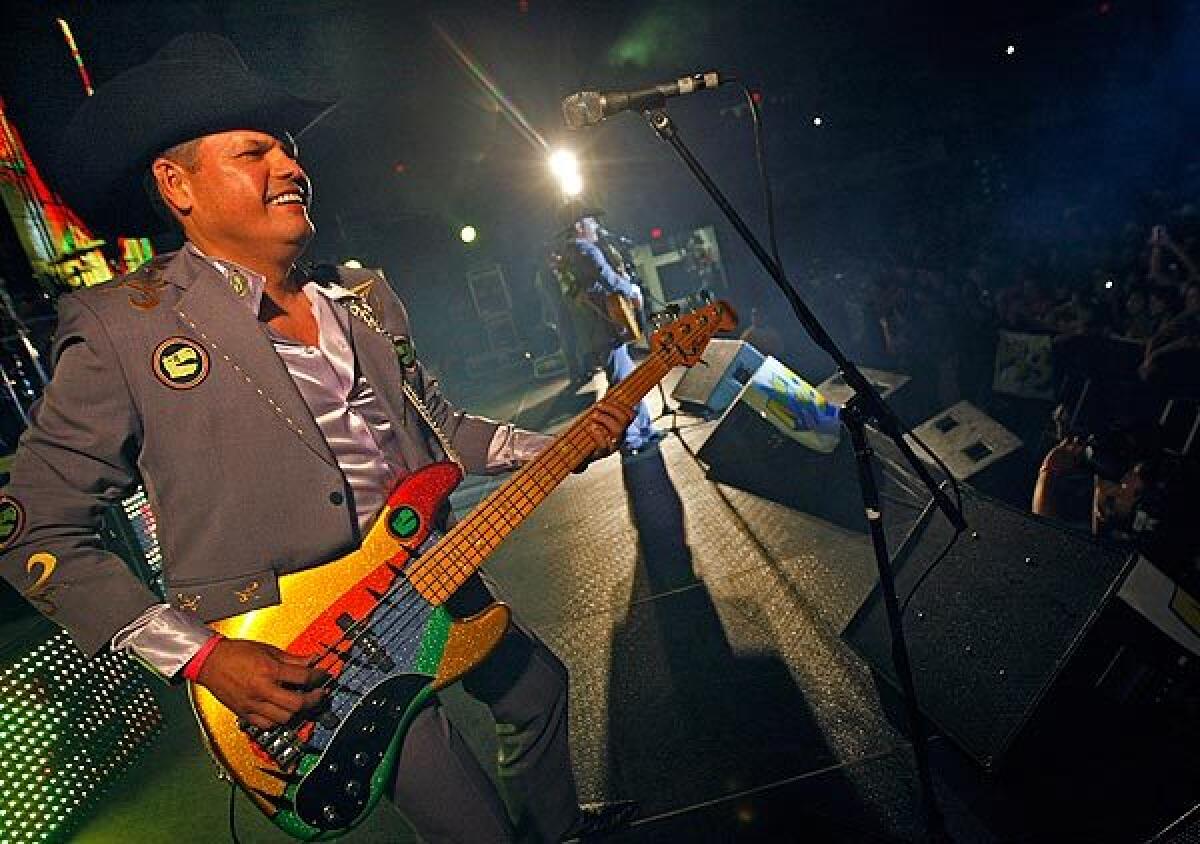Narco ballads without a home

Reporting from San Diego
It was the shout-out heard ‘round Tijuana.
Singer Mario Quintero, the mustachioed leader of Los Tucanes de Tijuana, cut into a perky number to yell a greeting to a pair of the band’s more ruthless fans, crime bosses known by their nicknames, El Teo and Muletas (Crutches).
“My regards to El Teo, and his compadre, Muletas,” Quintero said. “Arriba la maña” — “Mob rules.”
The crowd at the historic Agua Caliente racetrack cheered.
The city’s top cop, Julian Leyzaola, who was informed later, seethed.
Amid preparations for another Tucanes show in Tijuana last November, where the band was expected to sing a new ode to the drug kingpins, Leyzaola pulled the plug, leaving 11,000 angry ticketholders.
Nearly one year later, the Tucanes remain banned from performing in the city.
“It’s sad that we can’t play in Tijuana, because it’s the place where our band was born,” said Quintero, who was interviewed before a show last month in San Diego, the closest thing to a homecoming for the Grammy Award-nominated group.
Musical groups like The Tucanes who play narco-corridos — accordion-inflected ballads that tell the tales of drug kingpins — have been caught in the crossfire of governmental restrictions across Mexico. The music in some cities is muted on radio airwaves, nightclubs and even public buses. Several musicians have been murdered, most likely by traffickers who object to songs glorifying their rivals.
In Tijuana, where bands have been swept up in police raids, the campaign has been extraordinarily aggressive, highlighted by the feud between two of the city’s most popular figures: The Norteño band that rose to fame singing about outlaws, and the secretary of public security renowned for locking them up.
Leyzaola, a hard-charging commander, accuses the band of writing a song that included a threat against him. He ordered an investigation and vowed to arrest them if they play in the city again.
Even though Teo (Teodoro Garcia Simental) and Muletas (Raydel Lopez Uriarte) were captured early this year, Leyzaola still considers the band a dangerous influence. The shout-out at their last Tijuana concert to the men who killed 45 of his officers exemplified their close ties to organized crime, he said.
“They were yelling it. In public!” Leyzaola said.
Quintero, the Tucanes’ songwriter and lead guitarist, chooses his words carefully when the subject comes up. For a man who cultivates an outlaw image, he’s hardly a picture of menace. Mild-mannered, slightly built and polite to a fault, the 40-year-old father of three said his lyrics reflect a harsh reality that threatens at times to even claim him as a victim.
He’s a performer, not a saint, however, and ultimately he must answer to his fans, even the most notorious ones. “I’m not justifying them, or approving of what they do. We’re people that depend on our public and they deserve our attention,” Quintero said. “The señor [Leyzaola] shouldn’t fault us for the corridos as if we’re responsible for the killing of his police.”
::
The Tucanes rose to fame in the 1990s with tunes featuring double-entendres and brash lyrics chronicling the ripped-from-the-headlines adventures of drug traffickers, most prominently the hometown Arellano Felix drug cartel.
The band, made up of cousins originally from Sinaloa, broadened its repertoire with catchy dance tunes and ballads, becoming one of Mexico’s most popular acts. The band has sold more than 13 million compact discs and garnered several Grammy nominations.
While the Tucanes soared on the charts, Tijuana spiraled down into violence. The Arellano Felix cartel disintegrated in recent years into warring factions, turning the city into a dumping ground of beheaded bodies and massacre victims.
Leyzaola took charge of the Police Department in late 2007 and immediately launched an offensive against corruption and organized crime. Working with the Mexican military, he expanded the targets to include corrido bands.
At raids of quinceaneras and yacht parties attended by “most wanted” criminals, musical groups have been handcuffed and flown to Mexico City for interrogations.
Narco-corrido bands — most of whom vary their playlists with ballads and dance songs — can appear in the city as long as they play by Leyzaola’s rules. They must sign a contract that revokes payment if they play songs seen as glorifying traffickers. And Leyzaola stations officers offstage who pull the plug if bands stray from the approved playlist.
When singer El Komander scheduled an appearance at a nightclub earlier this year, Leyzaola paid a visit before the show and summoned him to his table. “I said, ‘Here, you’re in Tijuana, and you’re not going to come to Tijuana and do what you think is right,’ ” Leyzaola recalled telling the singer. “You sing pure narco-corridos and here we don’t permit it because I don’t want the kids to see narcos represented as role models.”
The argument that music can steer youths into a life of crime generates a chorus of criticism from the bands, their fans and many commentators. The crackdown, they say, is misguided, threatens freedom of expression and deflects attention from the government’s own failures.
Corrido singers, brushing aside links to organized crime as groundless, say their music speaks to the impoverished and politically marginalized masses of Mexico, giving voice to their frustrations. Singer Roberto Tapia, who is also banned from Tijuana, said people in his state of Sinaloa consider the kingpins the “Robin Hoods of Mexico.”
“Why? Because they are people who don’t extort you. They are people who won’t kill or kidnap you…. On the contrary, they are people that, yes, are part of that business, but with the desire of helping people,” Tapia said.
::
The criminal code Tapia describes was once honored by traffickers in Tijuana. Cartel leaders moved drugs through the city and limited most violence to the criminal underworld. But recent years have seen the rise of a new breed of crime boss, exemplified by the likes of Garcia and Lopez, who reaped riches in kidnapping and extortion targeting middle- and upper-class residents.
The Tucanes, sticking to their formula, performed new songs heralding the exploits of the new generation of kingpins. In “El Mas Bravo de los Bravos” (“The Most Vicious of the Vicious”), Lopez is portrayed as Tijuana’s Rambo, wearing war paint and waving an assault rifle from his armored car.
In another song that appeared on YouTube, Quintero seemingly mocks Leyzaola’s arrest of hit men sent by Lopez to assassinate him. The Tucanes deny uploading the video, which has since been removed from the website.
The band should have expected a backlash, critics say. Quintero lives in a suburb of San Diego, where many of his neighbors are former Tijuana residents who had to flee because of the violence.
“Their music portrays narcos as heroes. Obviously, they’re not heroes to us.” said Gabriel Benavides, a businessman whose family moved out of the city after Garcia’s gang kidnapped a loved one.
::
The Tucanes try to take the controversy in stride. They’re on the county fair circuit these days, playing in cities across the U.S. Earlier this year they were honored at the Grammy Museum in Los Angeles.
Most of the Tucanes live in the upscale suburbs of San Diego and drove themselves to the recent show at the San Diego Sports Arena. About 7,000 people filled the venue while Quintero took a seat in the spacious dressing room.
The singer portrays himself as a neutral, above-the-fray figure, a sort-of muckracker with a guitar who offers a running account of major events or shoot-’em-ups in Tijuana through music.
Quintero offered no apologies for sending a greeting to Teo and Muletas, who were not believed to be at the show in Tijuana that night in 2008. But he suggested that he did cross the line, if only under duress. Someone passed a request on a slip of paper, and he had to honor it.
“If they want a greeting and you don’t honor it they can hold it against you,” Quintero said. “You know how I defend myself? By being agreeable.”
When the Tucanes took the stage, a screen backdrop played campy music videos of a gun-toting Quinones surrounded by shapely women and mugging it up during bar brawls and shoot’-em-ups.
The band mostly played songs of heartbreak, and jaunty tunes like “La Chiqui Baby,” turning the arena floor into a sea of white cowboy hats and embracing couples bouncing to the beat of polkas.
When the band began their classic corrido songs, like the relatively tame, rags-to-drug-riches hit “El Centenario,” the audience began to sway. Fathers and daughters, teenage lovers, gaggles of young women in mini-dresses and lonely immigrants held hands and let the melody pour out in a big sing-along.
Quintero ended the show with a wave to the crowd.
He never mentioned Teo or Muletas.
The family-friendly vibe was too much for some fans. “The Tucanes have lost it. They’re very careful now,” said Jose Velasquez, a 27-year-old construction worker from San Diego. “When they got famous, they went soft.”
richard.marosi@latimes.com
More to Read
Start your day right
Sign up for Essential California for news, features and recommendations from the L.A. Times and beyond in your inbox six days a week.
You may occasionally receive promotional content from the Los Angeles Times.







